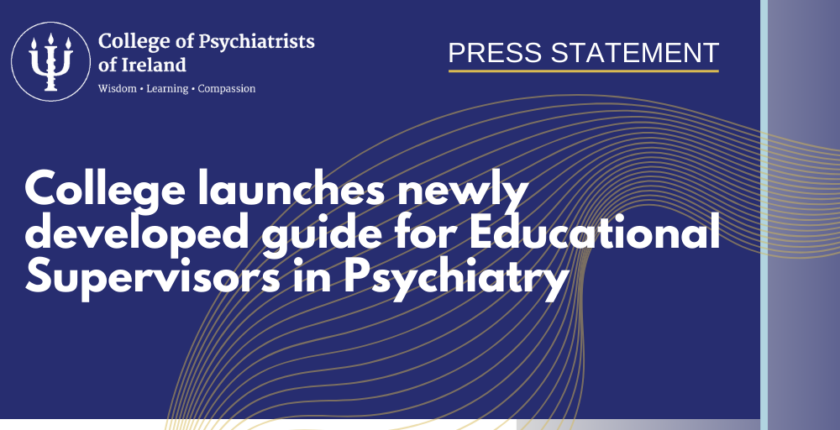Blog
Press Statement: College launches newly developed guide for Educational Supervisors in Psychiatry at its Inaugural Educational Supervisors’ Conference
- December 1, 2023
- Posted by: Ian Rice
- Category: Blog College in the media Conferences Events External Affairs & Policy Postgraduate Training Press Statements

Educational Supervisors play a pivotal role in upholding best practice standards in psychiatry and mental health services as part of their responsibility to supervise and support trainees to achieve the required knowledge, skills, and professional practices across multifaceted aspects of the specialty.
The Guide for Educational Supervisors, launched today, is underpinned by The Irish Medical Council ‘Guide to Professional Conduct and Ethics 8th edition 2019. The Guide, along with this one-day inaugural conference for supervisors, provides support and relevant information to help a supervisor to fulfil their role.
The in-person conference covered topics such as: ‘Equality, Diversity, Inclusion and Welfare in Postgraduate Medical Assessment’ by Professor Taz Goddard Fuller from the University of Liverpool, UK; ‘Entrustable Professional Activities’ by Professor Gozzie Offiah, NDTP/RCSI and Dr Josephine Boland, NUIG; and ‘Developing Simulation-Based Education Psychiatry’ by Professor Anne Doherty, Head of Courses, College of Psychiatrists of Ireland & Dr Eimear McMahon, Department of Psychiatry, Mater Misericordiae Hospital, Dublin. The conference also provided the added opportunity for supervisors to build relationships with each other at this first conference of its kind for psychiatry training in Ireland.
Opening the inaugural conference College President, Dr Lorcan Martin highlighted that:
‘Being a trainer is so much more than having a junior doctor on the team or assessing their learning outcomes or even providing supervision. It is a commitment to providing the guidance and support to a junior colleague so that they become the best that they can be. The role of supervising and educating our successors in medicine is usually a positive experience and as a legacy, for the next generation, is a role that is vital and one in which we should take considerable pride.
Dean of Education, Dr Aoibhinn Lynch Dean of Education for the College commented:
‘The role of an Educational Supervisor is long established but often underestimated in terms of its importance to trainees and clinical care. In some respects, the role has also become more complex over time. We hope to provide more guidance and support to Supervisors through events like today’s conference and online resources like our new Guide for Educational Supervisors.’
The College of Psychiatrists’ objective is to provide high standard training and education leading to patients in Irish Mental Health Services receiving the best evidenced based, up to date treatment and support.
See conference programme here.
ENDS
Note to Editor:
Every trainee, throughout all stages of the duration of the six to eight year psychiatry specialist training programme and pathway, has a designated Educational Supervisor for each training post.
The Educational Supervisor responsibilities, to and with a trainee, include mandatory one to one supervision, collaboration and support to aid completion of mandatory training requirements, achieve other training requirements and preparation for assessment processes that occur throughout the training placement. The Educational Supervisors are also responsible for the completion of supervisor reports, which are crucial for decisions on the training progress of the trainee.
An Educational Supervisor must be a member of the College, on the Specialist Register of the IMC as well as in a recognised consultant post in a service accredited for training.
